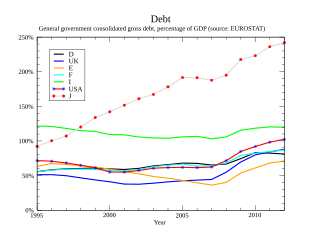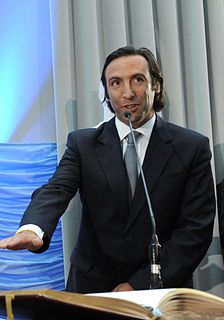Top-down and bottom-up are both strategies of information processing and knowledge ordering, used in a variety of fields including software, humanistic and scientific theories, and management and organization. In practice, they can be seen as a style of thinking, teaching, or leadership.
Debt restructuring is a process that allows a private or public company or a sovereign entity facing cash flow problems and financial distress to reduce and renegotiate its delinquent debts to improve or restore liquidity so that it can continue its operations.

In accounting, insolvency is the state of being unable to pay the debts, by a person or company (debtor), at maturity; those in a state of insolvency are said to be insolvent. There are two forms: cash-flow insolvency and balance-sheet insolvency.
A structured product, also known as a market-linked investment, is a pre-packaged structured finance investment strategy based on a single security, a basket of securities, options, indices, commodities, debt issuance or foreign currencies, and to a lesser extent, derivatives. Structured products are not homogeneous — there are numerous varieties of derivatives and underlying assets — but they can be classified under the aside categories. Typically, a desk will employ a specialized "structurer" to design and manage its structured-product offering.

The Argentine debt restructuring is a process of debt restructuring by Argentina that began on January 14, 2005, and allowed it to resume payment on 76% of the US$82 billion in sovereign bonds that defaulted in 2001 at the depth of the worst economic crisis in the nation's history. A second debt restructuring in 2010 brought the percentage of bonds under some form of repayment to 93%, though ongoing disputes with holdouts remained. Bondholders who participated in the restructuring settled for repayments of around 30% of face value and deferred payment terms, and began to be paid punctually; the value of their nearly worthless bonds also began to rise. The remaining 7% of bondholders were later repaid in full, after centre-right and US-aligned leader Mauricio Macri came to power in 2015.
Restructuring is the corporate management term for the act of reorganizing the legal, ownership, operational, or other structures of a company for the purpose of making it more profitable, or better organized for its present needs. Other reasons for restructuring include a change of ownership or ownership structure, demerger, or a response to a crisis or major change in the business such as bankruptcy, repositioning, or buyout. Restructuring may also be described as corporate restructuring, debt restructuring and financial restructuring.

The Latin American debt crisis was a financial crisis that originated in the early 1980s, often known as La Década Perdida, when Latin American countries reached a point where their foreign debt exceeded their earning power, and they were not able to repay it.
Cognitive therapy (CT) is a type of psychotherapy developed by American psychiatrist Aaron T. Beck. CT is one therapeutic approach within the larger group of cognitive behavioral therapies (CBT) and was first expounded by Beck in the 1960s. Cognitive therapy is based on the cognitive model, which states that thoughts, feelings and behavior are all connected, and that individuals can move toward overcoming difficulties and meeting their goals by identifying and changing unhelpful or inaccurate thinking, problematic behavior, and distressing emotional responses. This involves the individual working with the therapist to develop skills for testing and changing beliefs, identifying distorted thinking, relating to others in different ways, and changing behaviors. A cognitive case conceptualization is developed by the cognitive therapist as a guide to understand the individual's internal reality, select appropriate interventions and identify areas of distress.
The Panic of 1825 was a stock market crash that started in the Bank of England, arising in part out of speculative investments in Latin America, including an imaginary country: Poyais. The crisis was felt most acutely in Britain, where it led to the closure of twelve banks. It was also manifest in the markets of Europe, Latin America and the United States. An infusion of gold reserves from the Banque de France saved the Bank of England from collapse. The panic has been called the first modern economic crisis not attributable to an external event, such as a war, and so the start of modern economic cycles. The Napoleonic Wars had been highly profitable for all sectors of the British financial system, and the expansionist monetary actions taken during transition from war to peace brought a surge of prosperity and speculative ventures. The stock market boom became a bubble and banks caught in the euphoria made risky loans.
Cockle Creek Smelter was a zinc and lead smelter located at the northern end of Lake Macquarie near Boolaroo in Newcastle, New South Wales. The smelter was built in by the Sulphide Corporation in 1896 and the first attempts to refine zinc using the Ashcroft Process began in 1897 but that process was abandoned shortly after due to technical difficulties.
Economic restructuring is used to indicate changes in the constituent parts of an economy in a very general sense. In the western world, it is usually used to refer to the phenomenon of urban areas shifting from a manufacturing to a service sector economic base. It has profound implications for productive capacities and competitiveness of cities and regions. This transformation has affected demographics including income distribution, employment, and social hierarchy; institutional arrangements including the growth of the corporate complex, specialized producer services, capital mobility, informal economy, nonstandard work, and public outlays; as well as geographic spacing including the rise of world cities, spatial mismatch, and metropolitan growth differentials.
A sovereign default is the failure or refusal of the government of a sovereign state to pay back its debt in full when due. Cessation of due payments may either be accompanied by that government's formal declaration that it will not pay its debts (repudiation), or it may be unannounced. A credit rating agency will take into account in its gradings capital, interest, extraneous and procedural defaults, and failures to abide by the terms of bonds or other debt instruments.
The default traps in sovereign borrowing refers to the idea that once a country falls into a default, it is more likely to default again in the future, compared to another country with identical future output ability. The idea of default traps is related with the asymmetric information between the borrower and the lender about the expectation of borrower's future output (GDP), the negative output shocks that increase the borrower's future default probability and other possible factors like political shocks.
In finance, a GDP-linked bond is a debt security or derivative security in which the authorized issuer promises to pay a return, in addition to amortization, that varies with the behavior of Gross Domestic Product (GDP). This type of security can be thought as a “stock on a country” in the sense that it has “equity-like” features. It pays more/less when the performance of the country is better/worse than expected. Nevertheless, it is substantially different from a stock because there are no ownership-rights over the country.
A deficit is the amount by which a sum falls short of some reference amount.

Debt crisis is a situation in which a government loses the ability of paying back its governmental debt. When the expenditures of a government are more than its tax revenues for a prolonged period, the government may enter into a debt crisis. Various forms of governments finance their expenditures primarily by raising money through taxation. When tax revenues are insufficient, the government can make up the difference by issuing debt.

Hernán Gaspar Lorenzino is an Argentine lawyer and public policy maker. He was appointed Minister of Economy of Argentina by President Cristina Kirchner in 2011.

The public debt of Puerto Rico is the money borrowed by the government of Puerto Rico through the issue of securities by the Government Development Bank and other government agencies.

The Puerto Rico Oversight, Management, and Economic Stability Act (PROMESA) is a US federal law enacted in 2016 that established a financial oversight board, a process for restructuring debt, and expedited procedures for approving critical infrastructure projects in order to combat the Puerto Rican government-debt crisis. Through PROMESA, the US Congress established an appointed Fiscal Control Board (FCB), known colloquially in Puerto Rico as "la junta," to oversee the debt restructuring. With this protection the then-governor of Puerto Rico, Alejandro García Padilla, suspended payments due on July 1, 2016. The FCB's approved fiscal austerity plan for 2017-2026 cut deeply into Puerto Rico's public service budget, including cuts to health care, pensions, and education, in order to repay creditors. By May 2017, with $123 billion in debt owed by the Puerto Rican government and its corporations, the FCB requested the "immediate" appointment of a federal judge to resolve the "largest bankruptcy case in the history of the American public bond market."






